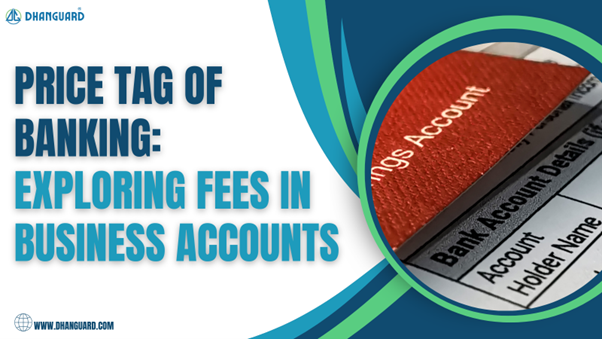In the bustling business hub of Dubai, establishing a stable financial foundation is essential for the success of any enterprise. One key aspect of this foundation is setting up a business bank account. A business bank account is a monetary account specifically designed for businesses to manage their financial transactions. It is a centralized platform for all economic activities, including receiving payments, making payments, processing payroll, etc. In this blog, we will delve into the essentials of business bank accounts, their significance, the various types available, and the features that make some banks stand out as the best for business banking.
Business Bank Account: Meaning and Significance
As its name implies, a business bank account is opened only in the company's name to meet its financial and banking requirements. Every day, managing a corporation entails many transactions about revenue, costs, personnel compensation, and other related areas. Some companies attempt to use their bank accounts to handle these transactions. This system has several drawbacks, including the difficulty and time separating business from personal expenses. On the other hand, a dedicated corporate bank account offers several advantages, such as a precise summary of expenditures and combined data upon which to make critical financial decisions.
A separate business account is a legal necessity in many jurisdictions and offers several advantages:
-
Legal Compliance: Separating business and personal finances is essential to maintain legal compliance and protect personal assets.
-
Professional Image: It enhances your business's credibility by providing clients and partners with a dedicated account for financial transactions.
-
Financial Management: Business accounts simplify financial management, making it easier to track income, expenses, and taxes.
Types of Business Bank Accounts
Now that we understand the importance of a business bank account let's explore the different types available to businesses in Dubai:
Savings Account:
This account can be an excellent option for businesses to earn interest on operating profits, the remaining funds after deducting all business expenses and the cost of items sold. But a business should only utilize it to preserve gains it intends to cash in on soon. Its limited withdrawal policy and stringent terms and conditions are the reason for this. This indicates unequivocally that a business would find it difficult to use or withdraw money in an emergency. Furthermore, direct cash withdrawals from ATMs and checks are only accepted for these accounts. Not many banks even restrict how many deposits businesses may make into this account. This type of account is suitable for small businesses that want to earn some interest on their surplus funds. However, savings accounts often have limited transaction capabilities.
Current Account:
Among the most flexible business bank accounts is this one. One could refer to an existing account as a necessary business banking account. Every firm conducts several transactions every day. This is made possible with the current version, which doesn't charge for the quantity of transactions. Although it doesn't pay interest on savings, it facilitates regular business transactions, which aids in the seamless operation of businesses. An existing account is the most common choice for businesses. It offers unlimited transactions, allowing companies to manage their daily financial activities efficiently.
Fixed Deposit Account:
Fixed deposit accounts are a viable option for businesses looking to earn higher interest rates while keeping funds locked for a specific period.
Account for Business Certificates of Deposit (CD):
Owners of businesses can earn interest on their operating profits by using this additional business bank account. This account's main selling point is that, in comparison to a corporate savings account, it offers significantly greater interest. The one drawback is that withdrawals of funds are prohibited before a predetermined period, which can range from a few months to years. There is a significant penalty if the money is taken out before the term's maturity.
Money Market Account:
If a business owner is looking for something between a business certificate of deposit (CD) account and a savings account, they can choose a money market account. Money market accounts provide for a monthly limit of checks to be drawn, depending on the bank. In addition to having ATMs, they offer a higher annual percentage yield than conventional business savings accounts. The ideal users for this account are companies with more significant savings holdings.
Merchant Services Account:
A merchant services account can simplify payment processing and improve cash flow if your business deals with a high volume of credit card trades. Businesses need this business bank account because it handles electronic payments such as credit and debit card transactions. The funds are automatically transferred from a merchant bank account, where they are deposited, to another bank account already open with a firm. There is a contract in place for this account. The business will be penalized if it closes the report before the contract expires.
Foreign Currency Account:
Businesses that engage in international trade can benefit from foreign currency accounts, which allow transactions in different currencies.
Features of the Best Business Bank Accounts
Choosing the right bank for your business account is crucial. Here are some features to consider when assessing the best bank for your business account:
-
Low Fees: Look for a bank that offers competitive fees, primarily if your business conducts a high volume of transactions.
-
Online banking: Most business bank accounts have online banking capabilities that let companies transact and view account details from any location with an Internet connection.
-
Vendor management: Businesses can ensure on-time payments and simpler recordkeeping by using a vendor management function to handle vendor invoices and payouts.
-
Credit cards: Business credit cards are available from some bank accounts for usage to earn rewards and make purchases. If businesses qualify for incentives, this might be a handy way for them to make purchases.
-
Overdraft Facilities: Some businesses may require overdraft facilities to manage cash flow effectively.
-
Customer Support: Exceptional customer support is vital, as it can make a significant difference in resolving any banking-related issues.
-
Interest Rates: For savings and fixed deposit accounts, competitive interest rates can help your business earn more from its funds.
-
International Banking Services: If your company operates internationally, consider a bank with solid international banking services and forex solutions.
-
Cheque Books and Debit Cards: Debit cards, which may be used to take out cash from ATMs, and cheque books are provided with business bank accounts so that payments can be made to suppliers and vendors.
Benefits of opening a Business Bank Account
Opening a business bank account offers several benefits that can help streamline your business operations and improve your financial management. Here are some of the key advantages:
-
Professionalism: Having a dedicated business bank account lends professionalism to your business. It reinforces the legitimacy of your business in the eyes of customers, suppliers, and partners.
-
Financial Organization: Business accounts allow you to separate your personal and business finances. This makes it much easier to track income, expenses, and taxes, which can simplify your accounting and tax reporting.
-
Credibility: A business bank account can help build credibility with lenders, investors, and suppliers. It demonstrates that you are serious about your business and have a structured financial system.
-
Record Keeping: Business bank accounts often have recordkeeping and financial management tools. You can easily access transaction histories, generate financial reports, and monitor cash flow.
-
Access to Business Financing: When you have a business bank account, it can be easier to access business loans, lines of credit, or other financing options. Lenders often require a business bank account for financial transactions related to loans or credit lines.
-
Tax Efficiency: Separating business and personal finances can simplify tax preparation. It allows you to deduct legitimate business expenses and avoid mixing personal and business transactions, making it easier to comply with tax regulations.
-
Expense Tracking: Business bank accounts often provide tools for categorizing and tracking business expenses, making it easier to identify cost-saving opportunities and manage your budget effectively.
-
Protection from Liability: A business bank account can protect your assets in case of legal issues or lawsuits involving your business. Keeping your finances separate helps maintain the limited liability status of many business structures.
-
Employee Payroll: If you have employees, a business bank account allows you to set up payroll systems and pay your employees quickly and efficiently.
Opening a Business Bank Account
Opening a business bank account in Dubai involves specific steps, which may vary depending on the bank and the type of account you choose. Typically, you will need the following documents:
-
Trade License
-
Passport copies of owners/shareholders
-
Memorandum of Association (MOA)
-
Residence Visa (if applicable)
-
Proof of Address
-
Business Plan (for certain types of accounts)
It's advisable to check with the chosen bank for their specific requirements and consult a business consultant for guidance.
Crucial things to think about before obtaining a business bank account
Some essential things to think about before obtaining a business bank account are as follows:
Monthly Maintenance Fees:
In India, many banks have monthly account maintenance fees. If their company is tiny or just established, business owners should educate themselves about the additional costs and determine whether they can afford them.
Minimum Balance Requirements:
A minimum balance must be kept in some banks' accounts. Business owners can be concerned about achieving these criteria and the possible fines or charges for failing to maintain the required amount, particularly during slow growth.
Overdraft fees:
Business bank accounts usually have an overdraft feature that lets companies borrow up to a certain amount. However, using this facility could come with high fees and interest rates from banks, so business owners must be aware of any potential debt.
Transaction Fees:
Many Indian banks charge transaction fees for various services, including internet transfers, cash deposits, check clearing, etc.
Bank Reputation and Services:
The bank providing the current account may raise concerns among business owners over its reputation and services. They might be concerned about shoddy customer service, a lack of technological resources, and restricted branch accessibility.
Compliance with Requirements:
Business owners must know the regulatory compliance requirements to operate a business bank account. This could involve keeping accurate accounting records, complying with KYC (Know Your Customer) regulations, filing taxes, and fulfilling other legal obligations.
How do you open a business bank account?
To open a business bank account, follow these steps:
-
Decide which bank, financial institution, or platform you would like to open a business bank account with.
-
Get ready the paperwork you need to send in to open the account. The paperwork should include information on agreements, business details, employer identification numbers, and owner identities.
-
You can open the account in person at your selected bank branch or online via the financial institution's website. The online procedure may differ throughout banks.
-
Send in the application form and the necessary paperwork. Your online account for business transactions will be successfully set up following the verification process.
Best Bank for Business Bank Account in the UAE
The best bank for a business account in the UAE can vary depending on your business needs and preferences. Some of the top banks in the UAE that are known for their business banking services include:
-
Emirates NBD
-
Dubai Islamic Bank
-
Mashreq Bank
-
First Abu Dhabi Bank (FAB)
-
Abu Dhabi Commercial Bank (ADCB)
-
Commercial Bank of Dubai (CBD)
When choosing the best bank for your business, consider the specific services your business needs, fees, reputation, branch and ATM accessibility, and customer service and support. It's also essential to consider whether you need conventional or Islamic banking services, depending on your business's preferences and requirements.
Conclusion
In the vibrant business landscape of Dubai, a well-managed business bank account is an essential tool for success. Whether you opt for a savings, current, fixed deposit, or another type of account, choosing the right bank and understanding its features is crucial. By doing so, you can ensure that your business is equipped to handle its financial transactions efficiently, maintain legal compliance, and thrive in the competitive market. Connect with Dhanguard Business and Banking Consultancy for expert guidance on your business bank account journey in the UAE, ensuring a smooth and successful financial experience.
DhanGuard: All-in-One Solution for Business Setup in Dubai, UAE
DhanGuard is your ultimate one-stop solution for all your business needs. Whether you’re planning to set up a new company or expand your existing business in the UAE, we’ve got you covered with our comprehensive range of services. From Business Setup in UAE and Company Formation in Dubai to managing your financial and legal compliance, we provide everything you need under one roof.
Our services include:
- Company Formation in UAE and Dubai
- Opening a Business Bank Account in UAE and Dubai with a 99% success rate
- VAT & Corporate Tax Compliance
- Accounting, Bookkeeping, and Auditing Services
- Trade License Renewal
- Golden Visa Assistance
Let DhanGuard make your journey of Business Setup in Dubai seamless and hassle-free!











